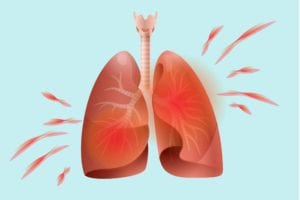When you think about rheumatoid arthritis (RA), joint pain, swelling, and stiffness probably come to mind. While it’s true that RA significantly impacts the joints, this autoimmune disease can also damage a variety of other body parts, including your skin, eyes, heart, digestive tract, and lungs.
Studies have suggested that anywhere from 1 to 58% of RA patients develop interstitial lung disease (ILD), which happens when scar tissue builds up in the lungs, causing shortness of breath and a dry cough.
Research has found that RA patients who get interstitial lung disease are much more likely to die prematurely. Part of the problem is that most people don’t know they have ILD until they begin having symptoms, and once symptoms start ILD can be slowed but the damage can’t be undone.
That said, not all ILD cases are the same. Many experts believe that one form called “usual interstitial pneumonia” (UIP) pattern of ILD is the most deadly, though recent studies have questioned whether that’s accurate. To find out, researchers led by Namrata Singh, MD, of the University of Iowa Hospitals and Clinics, conducted a meta-analysis of 10 previous studies that compared the UIP pattern to other patterns of ILD in rheumatoid arthritis patients.
According to their findings, which were published in the journal Seminars in Arthritis and Rheumatism, RA patients with the UIP form of ILD do have a higher mortality risk compared to those with other forms of ILD. They also found that the type of treatment used was important: RA patients with ILD were less likely to die during the course of the studies if they took methotrexate or cyclophosphamide (an immunosuppressant).
RA patients who scored higher on lung function tests (they could expel more air during forced breath tests) and those who had a smaller portion of their lungs impacted by ILD (as measured with CTs) were also more likely to survive. According to the researchers, these physiological factors seemed to be more important than whether someone had the UIP form.
They concluded that “pulmonary physiology and the extent of lung involvement [might be more] significant predictors of mortality,” though further study is warranted.
Get more information about how arthritis affects the lungs and what you can do to protect yourself.






